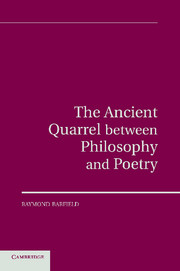Book contents
- Frontmatter
- Contents
- Acknowledgments
- Introduction
- 1 Socrates, Plato, and the Invention of the Ancient Quarrel
- 2 Aristotle, Poetry, and Ethics
- 3 Plotinus, Augustine, and Strange Sweetness
- 4 Boethius, Dionysius, and the Forms
- 5 Thomas and Some Thomists
- 6 Vico's New Science
- 7 Kant and His Students on the Genius of Nature
- 8 Hegel and the Owl of Minerva
- 9 Kierkegaard: A Poet, Alas
- 10 Dilthey: Poetry and the Escape from Metaphysics
- 11 Nietzsche, Heidegger, and the Saving Power of Poetry
- 12 Mikhail Bakhtin and Novelistic Consciousness
- Index
- References
3 - Plotinus, Augustine, and Strange Sweetness
Published online by Cambridge University Press: 03 May 2011
- Frontmatter
- Contents
- Acknowledgments
- Introduction
- 1 Socrates, Plato, and the Invention of the Ancient Quarrel
- 2 Aristotle, Poetry, and Ethics
- 3 Plotinus, Augustine, and Strange Sweetness
- 4 Boethius, Dionysius, and the Forms
- 5 Thomas and Some Thomists
- 6 Vico's New Science
- 7 Kant and His Students on the Genius of Nature
- 8 Hegel and the Owl of Minerva
- 9 Kierkegaard: A Poet, Alas
- 10 Dilthey: Poetry and the Escape from Metaphysics
- 11 Nietzsche, Heidegger, and the Saving Power of Poetry
- 12 Mikhail Bakhtin and Novelistic Consciousness
- Index
- References
Summary
“Through a man puffed up with monstrous pride,” Augustine writes in his Confessions, “you brought under my eye some books of the Platonists, translated from Greek and Latin. There I read, not of course in these words, but with entirely the same sense and supported by numerous and varied reasons, ‘In the beginning was the Word and the Word was with God and the Word was God.’” Saint Augustine says that he met Christ, the Logos, in the work of Plotinus and that of his disciple Porphyry. Much later he encountered head-on both the pagan philosophers and the poets in light of this encounter. Indeed, the ancient quarrel between poetry and philosophy is at the heart of the young Augustine's own life and is at the heart of the mature Augustine's encounter with all Greek and Roman literature and philosophy in The City of God, where the poets' need for the corrective response of philosophy is rooted in the active malevolence of the demonic. Given the impact of Augustine on subsequent thought and the impact of Plotinus on Augustine, it is worthwhile starting with a brief look at the work of Plotinus.
Addressing the accusation that poetry obstructed the view of truth required that philosophy intervene, yet the intervention has shown that poetry has contributed positively to the ways in which questions are posed in philosophy, especially metaphysics and ethics.
- Type
- Chapter
- Information
- The Ancient Quarrel Between Philosophy and Poetry , pp. 52 - 85Publisher: Cambridge University PressPrint publication year: 2011



